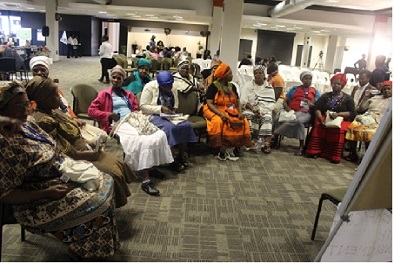The conference, came true to its theme of promoting diversity, inclusivity and equality, through its programme structure. Two key outcomes were realised from the meeting. A Ministerial Declaration on actions required to increase water security and sanitation dignity was made and the participation of delegates in an Indaba.
Firstly, the Ministers present during the conference adopted a Ministerial Declaration on actions required to increase water security and sanitation dignity so as to achieve sustainable management of water resources. Through the statement, the Ministers Committed to accelerating the implementation of the AMCOW policy and strategy for mainstreaming gender in the water sector in Africa in countries. The Indaba also addressed issues of Governance, Funding gap, capacity building and Technology transfer, and the role of the international community, in strengthening women’s empowerment and ensuring the effective use of human, financial and technical resources for water management.
Secondly, delegates were involved in a one and half days ‘Indaba’. Indaba is a Zulu word describing a meeting or tribal council discussing important matters. The indaba set a road map of key issues that had to be implemented as follow-up from the generated collaborative and interactive discussions held during the group conversations. Through the discussions, and using a regulated process known as Open Space Technology to generate collaborative inputs, the delegates were involved in an interactive process in which the participants determined the topics to be discussed, decided which groups they wanted to participate in, and determined the content and outcomes of the conversation. Some of the key topics discussed involved Partnerships, budget allocations in influencing policy, Human rights issues, Monitoring and evaluation, and water quality.
Nomvula Mokonyane,Minister of Water Affairs and Sanitation, and Nompumelelo MaNtuli Zuma, First Lady of the Republic of South Africa, both addressed the meeting. Mokonyane also confirmed that the Declaration will be further translated into other South African official languages to cater to a broader audience.
Speaking at the end of the conference, Conference Chairperson Barbara Schreiner, emphasized on the need to keep the momentum and keep pushing to persuade key stakeholders to support the gender agenda. She noted that as a way of pushing the gender agenda beyond the conference, the Ministerial declaration would be shared with all water ministers in Africa to try to persuade to endorse it. Furthermore, the declaration would be shared at key events such as the World Water Forum. At continental level, it was noted that in order to keep pushing the gender agenda, there would be a Gender day at the African Water Week in 2016.
As a host to the Conference, South Africa made a commitment to have a Gender day in each water week every year.
